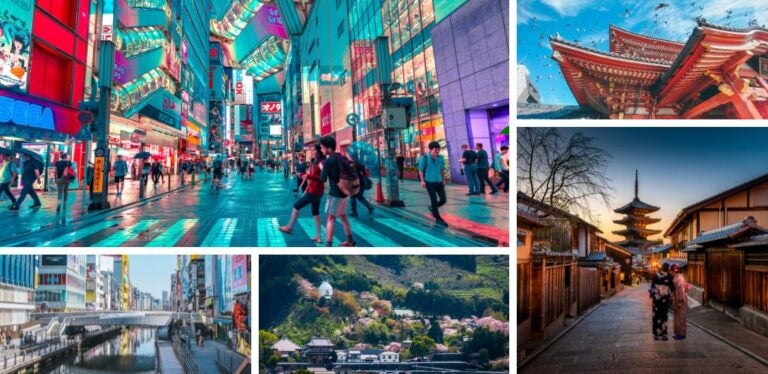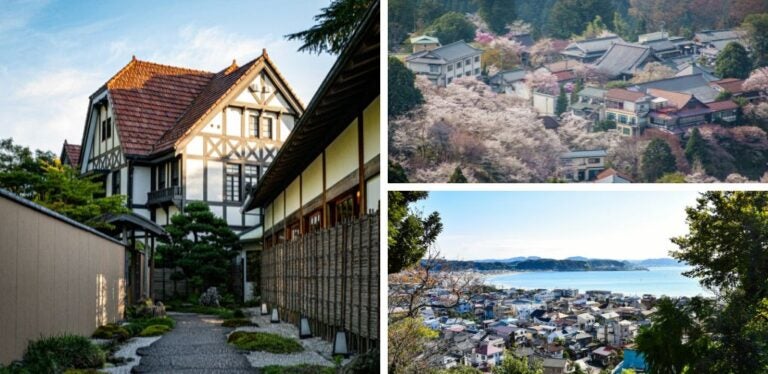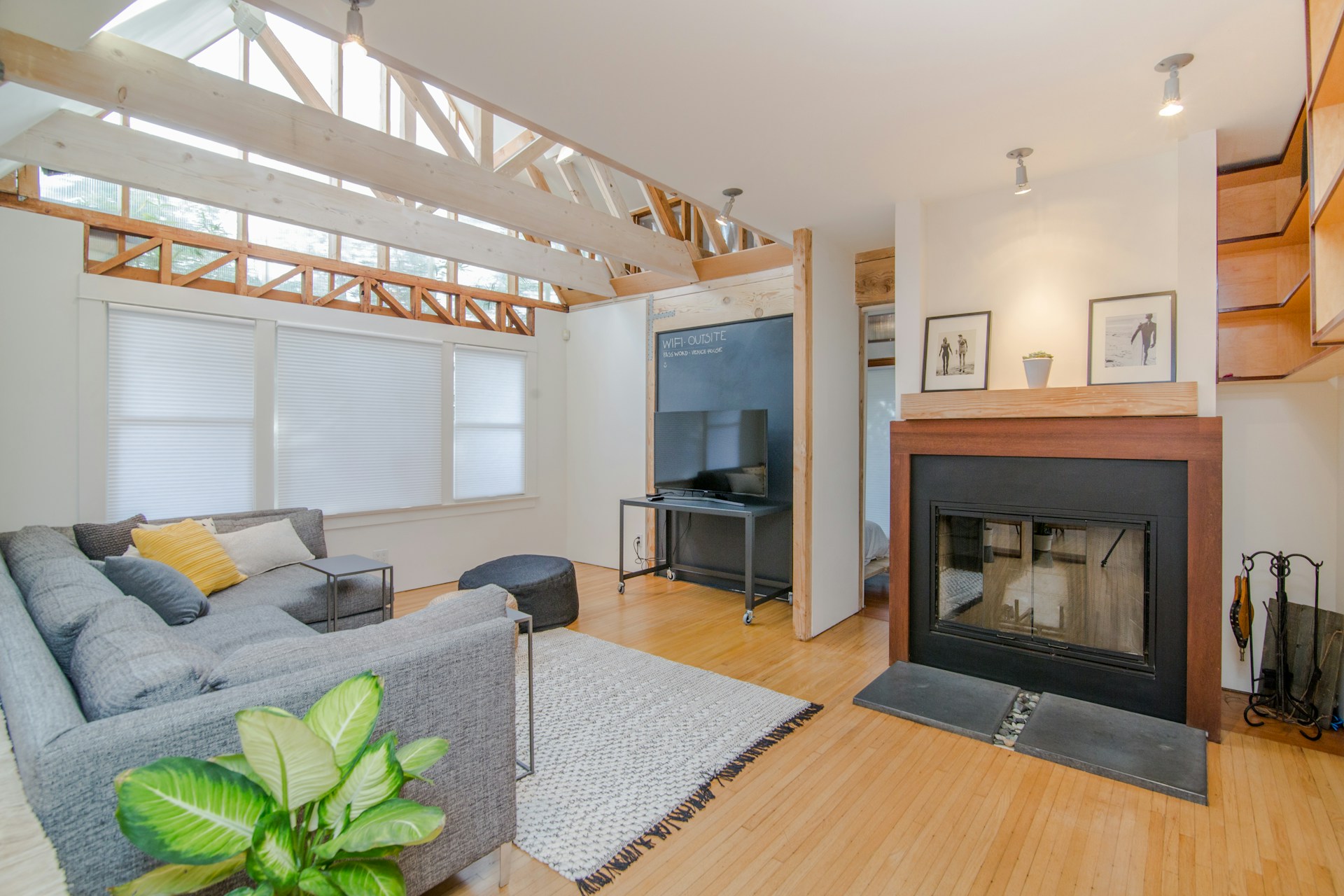Best Digital Nomad Cities in Japan
Are you thinking of choosing Japan as your next destination? These are the five best cities in Japan to live in if you are a digital nomad.
Have you ever dreamed of admiring the neon lights on the streets of Tokyo up close or going all the way to Kyoto to see the kōyō? If you work remotely, it is now easier than ever to spend time exploring the country. In March 2024 Japan launched its special visa for digital nomads. This visa has become very popular with the nomad community, which has made Japan one of the most popular destinations in recent times. If you’re considering a visit, this article is for you. Here, we reveal the best cities in Japan to live as a digital nomad.
We will look at the ideal cities to live in Japan, from urban options such as Tokyo and Osaka, to quieter places such as Fukuoka and Kyoto. We’ll tell you why they are ideal for remote working and what they have to offer. Join us to discover the base in the rising sun that suit would suit you best.
Top 5 cities to live in as a digital nomad in Japan
Who wouldn’t want to spend time exploring a country where one day you’re wandering between buildings adorned with neon signs and another sitting among the temples of a peaceful remote town? Japan is a fascinating destination, known for its technological advances and its friendly and courteous culture. This is precisely why it is becoming increasingly popular among digital nomads.
We tend to associate the land of the rising sun with the word “expensive”. But this is not entirely true. Living there as a digital nomad is more affordable than you think. Although prices are higher than in other Asian countries, rents are cheap and coworking facilities are reasonably priced. Let’s take a look at the five best cities to live in Japan:

5. Fukuoka
We’ll start the list with Fukuoka, on the northern coast of Kyushu. Fukuoka offers a rare balance between modernity and accessibility. Unlike other Japanese cities, its size is manageable, making it easy to get around by bike or on foot without relying too much on transport. Here, sea views combine with a lively tech scene and a handful of coworking spaces. It is known for its leisurely pace of life and a food scene that stands out especially in the yatai, small street stalls where you can try local dishes such as Hakata ramen.
You will find quite interesting options for working remotely, all of them well located. The city is experiencing a boom in coworking spaces such as Fukuoka Growth Next, popular with entrepreneurs and freelancers. But most of all, what makes Fukuoka an interesting option are the prices. Rents are more affordable than in Tokyo or Kyoto.
Reasons to choose Fukuoka as a remote work base
- Internet connectivity and speed: in general, the connections here are excellent. In coworking spaces and cafés they can reach speeds of 50 to 100 Mbps.
- Variety of coworking facilities: Fukuoka Growth Next and Tenjin Coworking are popular options, with an active community and good services.
- Affordable and flexible accommodation: Rental prices in Fukuoka are lower than in Tokyo or Kyoto, with studios starting at ¥60,000 (about $400).
- Cultural offerings: Don’t miss the temples and festivals, such as the Hakata Gion Yamakasa, which brings together locals and tourists.
- Weekend getaways: From Fukuoka you can explore natural destinations such as the island of Nokonoshima, famous for its flower fields, or take a trip to Beppu, a popular destination for its hot springs.
4. Nagoya
Situated between Tokyo and Osaka is Nagoya, one of Japan’s most industrial cities. It has a strong economy and a growing tech start-up scene. The cost of living is much more affordable than in Tokyo, but still gives you access to modern infrastructure and good connectivity. And thanks to its central location, you can easily move around to explore other cities.
Although the digital nomad community in Nagoya is small, it is growing steadily. There are several coworking spaces and cafés with good internet connections. Undoubtedly, a practical and comfortable option to settle down temporarily.
Reasons to choose Fukuoka as a remote work base
- Internet connectivity and speed: Reliable internet with speeds of up to 100 Mbps in central areas.
- Variety of coworking spaces: You’ll find options such as Nagoya Work Lab and Cowo, both in the city centre and known for their large spaces and affordable rates.
- Affordable and flexible accommodation: Rents are more affordable than in other major Japanese cities; you can find studios from 55,000 yen (about 370 dollars).
- Cultural offerings: In Nagoya you can explore Nagoya Castle and attend the Atsuta Festival, one of the highlights of the year at Atsuta Shrine.
- Weekend getaways: From Nagoya, it is easy to reach destinations such as the Japanese Alps or the shores of the Ise Peninsula, perfect for relaxation or outdoor activities.
3. Kyoto
Kyoto is the perfect destination for those seeking a life in a tranquil yet historic environment. With its ancient temples, zen gardens and picture-postcard landscapes, it attracts digital nomads looking for inspiration in everyday life. Unlike the big metropolises, here you will find a more leisurely pace and a different quality of life. It also has good train connections to Osaka and other cities.
For digital nomads, Kyoto has several quiet coworking spaces, ideal for those seeking a calmer environment. Although the cost of living is somewhat high, Kyoto is still an attractive option for remote work and a leisurely pace of life.
Reasons to choose Kyoto as a remote work base
- Internet connectivity and speed: Most coworking spaces and coffee shops in Kyoto offer internet speeds ranging from 50 to 100 Mbps, sufficient for video calls and cloud work.
- Variety of coworking spaces: Kyoto’s Node is a cosy, centrally located space, ideal for freelancers. Another popular option is Impact Hub Kyoto, which organises events to connect the community.
- Affordable and flexible accommodation: In less touristy areas such as Fushimi, you can find flats from ¥60,000 (about $400) a month.
- Cultural offerings: The Kinkaku-ji and Fushimi Inari temples are just two examples of the many things to see in Kyoto. Every November, the city celebrates the Jidai Matsuri festival, which revives Japanese history with an impressive parade.
- Weekend getaways: Nara, famous for its deer and temples, is within easy reach. Or Arashiyama, known for its bamboo forests and mountains.
2. Osaka
Osaka is known for its outgoing people and more relaxed lifestyle than Tokyo. Thanks to its excellent connections, it’s the perfect base to use if you’re travelling around the country.
In Osaka, you’ll find affordable rentals and an active digital nomad community. There are also all kinds of services adapted to remote working and networking events almost every day.
Reasons to choose Osaka as a remote work base
- Internet connectivity and speed: Excellent, with up to 100 Mbps in coworking spaces and accommodation.
- Variety of coworking spaces: Hive and Plus OSAKA are two of the most recommended, both in the city centre.
- Affordable and flexible accommodation: You can find flats from 50,000 yen (about 340 dollars) in central areas. Compared to Tokyo, it’s a more affordable option.
- Cultural offerings: Osaka has plenty to do, including Osaka Castle and the lively Dotonbori district, famous for its neon signs and varied cuisine.
- Weekend getaways: From Osaka it is easy to visit places like Kobe, famous for its wagyu beef. Or Nara, where you can explore historic parks and temples.
1. Tokyo
And here we are, number one! Tokyo, one of the most dynamic cities in the world. With an almost inexhaustible list of cultural attractions and modern infrastructure, it is a prime destination for digital nomads. Although the cost of living is higher than in other Japanese cities, it also offers the most opportunities and leisure options. Thanks to the large number of districts that divide it, you’ll have no trouble finding your place. Each district has its own personality and suits different lifestyles. For example, the neighbourhoods of Ebisu, Kichijoji or Shimokitazawa offer a calmer way of life.
The capital has an extensive network of coworking and co-living spaces. Remote working services are top-notch and the nomad community is growing all the time. Although prices are high, there is a huge range on offer. You will find flexible accommodation options without any problems.
Reasons to choose Tokyo as a remote work base
- Connectivity and internet speed: The capital has some of the best connection speeds in the world, with an average of 200-300 Mbps in coworking spaces and cafés.
- Variety of coworking spaces: Tokyo is famous for its coworking facilities, ranging from affordable options such as Lax Tokyo in Shibuya to luxury spaces in Roppongi.
- Affordable and flexible accommodation: Although the cost is high, you can find co-living and apartment-sharing options from ¥80,000 (about US$540) per month in areas such as Shinjuku and Shibuya.
- Cultural offerings: The city is home to everything from historic temples such as Senso-ji in Asakusa to modern districts such as Akihabara, a global reference point for tech lovers.
- Weekend getaways: A few hours away by train, you can visit Hakone, famous for its onsen springs and views of Mount Fuji. Or Nikko, known for its shrines and lush nature.
Important: If you are a frequent traveler and want to stay connected without worrying about expensive roaming or looking for a new SIM at every destination, Holafly’s subscription plans are for you. With a single eSIM, enjoy internet in more than 170 countries for a fixed price and no surprises on your bill. Travel without limits and connect easily and securely! 🚀🌍

Best towns to live as a digital nomad in Japan
Looking for a more laid-back lifestyle? Japan’s towns offer a quieter atmosphere and an opportunity to experience Japanese culture more closely. Many of these towns are equipped to accommodate remote workers and, not only that, in some you can find active nomad communities where you will have no trouble integrating if you wish to. Here are some of them:

- Kamiyama, Tokushima: Surrounded by mountains and with a strong community spirit, Kamiyama offers coworking facilities such as Kamiyama Valley Satellite Office and co-living options in the form of ShareHouse Kamiyama, with rents starting at ¥40,000 (US$290). It is a perfect destination for those seeking tranquillity and a collaborative lifestyle.
- Niseko, Hokkaido: Known for its snowy landscapes and winter sports, Niseko is ideal for lovers of the great outdoors. The Niseko Coworking space has mountain views, while the co-living space Always Niseko offers accommodation from 100,000 yen ($690) in a multicultural environment.
- Odaka, Fukushima: This revitalising town is perfect for those who want to engage with the local community. Odaka Pioneer Village, a coworking space in the middle of nature. And AddresShare, a co-living space from 40,000 yen (US$290), makes it an attractive place for nomads interested in rural Japan.
- Onomichi, Hiroshima: Located on the seafront, Onomichi combines tranquillity and coastal charm. Onomichi Share coworking and co-living at Onomichi Guest House, with prices starting at ¥50,000 (US$350), create a perfect environment for those seeking inspiration in a picturesque setting.
Why live as a digital nomad in Japan?
After discovering Japan’s best places to live, you may already know that you want to enjoy the many wonders it has to offer. Let’s take one last look, this time at what the land of the rising sun has to offer, so you can decide if it’s the perfect destination for you.
Advantages of choosing Japan as a base for digital nomads:
- Internet connection: Japan offers one of the fastest and most reliable internet networks in the world, available in both large cities and rural areas. However, as in any other destination, using a good VPN is recommended.
- Digital Nomad Visa: Since 2024, Japan has a specific visa for digital nomads. You will be able to stay in the country legally for up to one year, with the possibility of extension.
- Coworking and co-living spaces on the rise: Japan is seeing a huge development of coworking and co-living spaces, especially in Tokyo, Osaka and Fukuoka, but also in rural locations such as Kamiyama. What about prices? 20,000 to 30,000 yen per month (145 to 215 USD) in Tokyo and about 10,000 yen (72 USD) in smaller places.
- Quality healthcare: Japan has a high quality healthcare system, with modern facilities and qualified professionals. However, medical fees can be quite high. Taking out medical insurance for foreigners in Japan is advised.
- Culture and activities for all tastes: Japan’s cultural offerings are unrivalled. From traditional festivals to innovative digital art galleries, you’ll always have options to enjoy your free time. Japan’s landscapes are so varied that you can ski in winter, hike in spring or relax on its famous beaches in summer.
These are just a few reasons to consider Japan as your next base as a nomad. If you decide this is the destination for you, don’t forget to take a look at our guide on how to organise your trip to Japan. Ah! Remember to sign up for your Holafly eSIM before you leave to stay connected.
Frequently asked questions when choosing the best city to live as a digital nomad in Japan
The cost of living in Japan can vary greatly depending on the city or town you are in. In Tokyo, expenses can be around $1,600-3,200 per month. This amount includes accommodation, food and transport. In smaller towns or villages, on the other hand, costs can be reduced by up to 40%.
Yes, there are accommodation options to suit all tastes and budgets. In big cities, you can rent furnished flats through platforms such as Airbnb or Sakurastay, which specialises in temporary rentals. In small towns and cities, it is common to find co-living options and hostels with work areas. In addition, some ryokan (traditional lodgings) offer special packages for long stays.
Japan is a year-round destination with much to offer, but every season has its appeal. Spring (March to May) is famous for the cherry blossom, which is a spectacle in itself. Autumn (September to November) is ideal if you like the warm colours of the leaves in the parks and mountains. Summer temperatures can be high, especially in the big cities, while winter is a good time for those who enjoy skiing and the mountainous areas of the north. Don’t miss our complete guide on when to visit Japan to find out more.
Although not essential, learning Japanese can greatly enhance your experience and make everyday life easier, especially in less touristy areas. In big cities, many people speak English in coworking and international environments. If you plan to stay long-term, studying basic Japanese could help you integrate more easily and make the most of your experience.
Japan is one of the safest countries in the world, which makes it a very attractive destination for digital nomads. Crime rates are low and public transport is reliable and safe.





 Language
Language 


















 No results found
No results found







